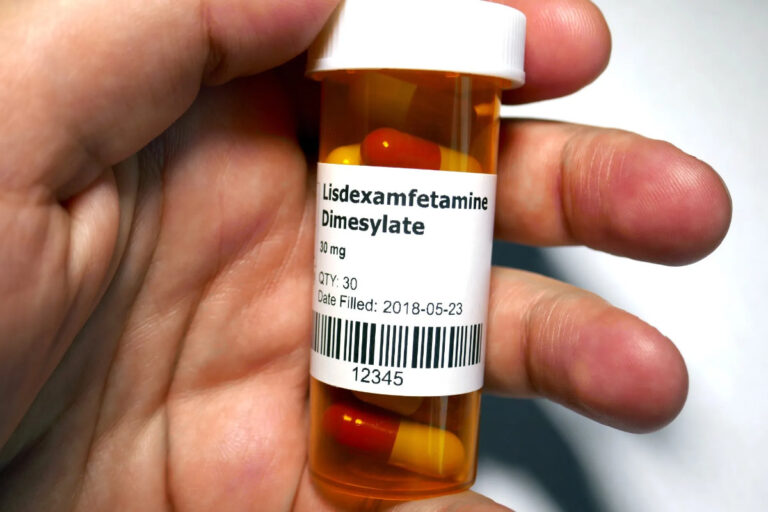Can Modafinil or Adderall Help You Lose Weight?
Some people wonder whether prescription stimulants like modafinil and Adderall can help with weight loss. Both drugs can reduce appetite, but they are not approved or recommended for this purpose. Understanding how these medications work, the evidence behind their effects on body weight, and the risks involved can help patients make informed choices.
How Modafinil and Adderall Work
Modafinil
Modafinil is a central nervous system stimulant used to treat narcolepsy, shift work sleep disorder, and obstructive sleep apnea (FDA, 2015). It promotes wakefulness mainly by increasing dopamine in the brain and may also influence norepinephrine, serotonin, and other neurotransmitter systems (Greenblatt & Adams, 2025). Unlike amphetamines, it has a lower potential for abuse.
Adderall
Adderall is a combination of amphetamine salts that increase dopamine, norepinephrine, and serotonin. This stimulant effect often reduces appetite and can lead to weight loss (Jones, Caul, & Hill, 1992). Adderall is a Schedule II controlled substance, reflecting its high risk of misuse and dependence.
Can Modafinil or Adderall Cause Weight Loss?
Evidence for Modafinil
Clinical trials of modafinil did not list weight loss as a common outcome. However, reduced appetite, nausea, and gastrointestinal side effects can sometimes contribute to weight change (FDA, 2015).
- A human study showed that modafinil decreased calorie intake by 18 to 38 percent, depending on the dose, without tolerance developing over three days (Perez, Haney, Foltin, & Hart, 2008).
- A case report described a patient who lost 40 pounds after starting modafinil with clozapine treatment, though this is anecdotal and not generalizable (Henderson et al., 2005).
Overall, evidence suggests modafinil may modestly reduce food intake, but it has not been proven effective or safe for weight loss.
Evidence for Adderall
Adderall’s appetite-suppressing effects are well documented. Users often eat less and lose weight in the short term (Jones et al., 1992). However, weight loss is usually temporary. After stopping the drug, many people regain the weight due to rebound hunger.
Non-medical use of stimulants like Adderall for weight control is reported among college students, often linked to disordered eating and unsafe practices (Jeffers & Benotsch, 2014). Adderall is not approved for weight loss, and using it this way is considered misuse.
Risks and Side Effects
Modafinil
Common side effects include headache, nausea, insomnia, dizziness, and diarrhea. Serious but rare reactions include Stevens-Johnson syndrome, psychiatric symptoms, and cardiovascular events (FDA, 2015; Greenblatt & Adams, 2025).
Adderall
Adderall can cause appetite loss, irritability, insomnia, headaches, and elevated blood pressure. Severe risks include dependence, cardiovascular complications, stroke, and sudden death in rare cases. Because of these dangers, Adderall carries an FDA boxed warning (FDA, 2015).
Who Should Avoid These Medications?
- Modafinil should not be used by people with a history of serious skin reactions, certain heart conditions, or hypersensitivity to the drug (FDA, 2015).
- Adderall should be avoided in people with severe heart disease, high blood pressure, glaucoma, or a history of substance abuse (Greenblatt & Adams, 2025).
Pregnant and breastfeeding women should not take either drug without medical supervision.
Comparing Modafinil and Adderall for Weight Loss
- Modafinil: May mildly reduce appetite but lacks strong evidence for long-term weight loss. Lower abuse potential than amphetamines.
- Adderall: Stronger appetite suppression and short-term weight reduction, but carries much higher risks of addiction and serious side effects.
Neither drug is recommended as a weight-loss solution. Safer, long-term strategies such as diet changes, exercise, and FDA-approved weight-loss medications are more appropriate.
Conclusion
Modafinil and Adderall can suppress appetite and cause weight loss in some individuals. However, the evidence for modafinil is weak and anecdotal, and while Adderall has stronger effects, its risks outweigh potential benefits. Neither drug is approved for weight management.
Patients interested in weight loss should discuss safe, effective strategies with a healthcare provider rather than misusing prescription stimulants.
FAQs
Can I take modafinil to lose weight?
No. Modafinil is not approved for weight loss and evidence is limited. Its use should be restricted to approved conditions like narcolepsy and shift work sleep disorder (FDA, 2015).
Does Adderall cause permanent weight loss?
No. Weight loss from Adderall is usually temporary. Most people regain the weight after stopping the drug due to increased hunger (Jeffers & Benotsch, 2014).
Is it safe to use Adderall without a prescription for dieting?
No. Using Adderall without a prescription is misuse, linked to health risks, dependence, and eating disorders (Jeffers & Benotsch, 2014).
Are there safer alternatives for weight loss?
Yes. FDA-approved weight-loss medications and structured lifestyle changes are safer and more effective options than using stimulants off-label.
References
- U.S. Food and Drug Administration. (2015). PROVIGIL® (modafinil) tablets, for oral use, C-IV [prescribing information]. U.S. Department of Health and Human Services. https://www.accessdata.fda.gov/drugsatfda_docs/label/2015/020717s037s038lbl.pdf
- Greenblatt, K., & Adams, N. (2025). Modafinil. In StatPearls [Internet]. StatPearls Publishing. https://www.ncbi.nlm.nih.gov/books/NBK531476/
- Perez, G. A., Haney, M., Foltin, R. W., & Hart, C. L. (2008). Modafinil decreases food intake in humans subjected to simulated shift work. Pharmacology, Biochemistry, and Behavior, 90(4), 717–722. https://doi.org/10.1016/j.pbb.2008.05.018
- Henderson, D. C., Louie, P. M., Koul, P., Namey, L., Daley, T. B., & Nguyen, D. D. (2005). Modafinil-associated weight loss in a clozapine-treated schizoaffective disorder patient. Annals of Clinical Psychiatry, 17(2), 95–97. https://doi.org/10.1080/10401230590932407
- Jones, J. R., Caul, W. F., & Hill, J. O. (1992). The effects of amphetamine on body weight and energy expenditure. Physiology & Behavior, 51(3), 607–611. https://doi.org/10.1016/0031-9384(92)90187-7
- Jeffers, A. J., & Benotsch, E. G. (2014). Non-medical use of prescription stimulants for weight loss, disordered eating, and body image. Eating Behaviors, 15(3), 414–418. https://doi.org/10.1016/j.eatbeh.2014.04.019








